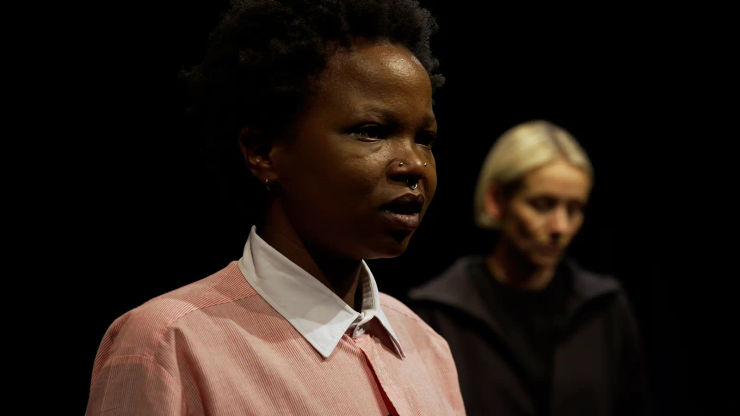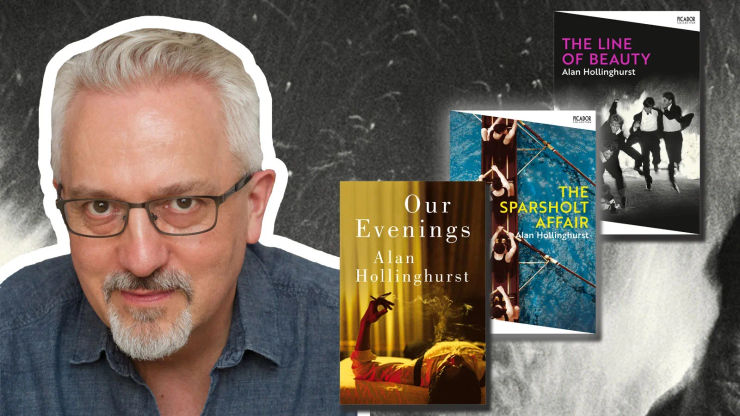'Queer history is so often fragmented, erased or silenced. . . theatre allows us to recover and reimagine it.'
The co-directors of Green Carnation Company on their collaboration with Picador and Alan Hollinghurst, and celebrating new voices in theatre.

To mark the paperback publication of Alan Hollinghurst’s novel Our Evenings, and its actor protagonist, David Win, Picador partnered with Green Carnation Company, a Manchester-based theatre company, on a prize for stage writing. Writers were asked to enter a short monologue or duologue that explored queerness, theatre, and memory, with the winner receiving a cash prize, script development mentorship and the opportunity to have their script produced as a filmed stage performance. We spoke to Green Carnation co-directors Dan Ellis and Dan Jarvis about the competition.
Tell us a little about Green Carnation and why you started the company
We’re a Manchester-based theatre company dedicated to telling queer stories through quality theatre. From staging existing plays to developing brand queer new writing, our aim is always to make work that excites, provokes and resonates.
Green Carnation was founded in 2018 – born out of a conversation on Instagram, a few pints, and a Halloween party where one of us was dressed as Kate Bush and the other as a character from Heathers. It felt inevitable, really.
We were both desperate to make theatre, but working full-time jobs meant that many of the usual routes into the industry weren’t accessible. So instead of constantly knocking on doors, we set our own company up.
And the name? The green carnation became a discreet symbol of gay identity in the late nineteenth century when Oscar Wilde and his circle wore them as a secret code. Because carnations don’t bloom green naturally, the colour hinted at queerness as something “unnatural” in the eyes of society –while still appearing fashionable and flamboyant. That mix of subversion, beauty and coded history felt like the perfect emblem for what we do.
Each project is rooted in our mission: to use theatre to tell queer stories with integrity, originality and impact.
Could you tell us how Alan Hollinghurst’s themes in Our Evenings inspired the competition?
Hollinghurst has always loomed large for us – Dan J first fell in love with Alan’s work when he read The Line of Beauty at twenty-one and then studied The Swimming Pool Library during his Masters degree at University of Manchester, and insisted Dan E read it too (which they did in about three days). Hollinghurst’s writing is a masterclass in layering queer history, desire, joy, privilege and complicity with elegance and razor sharp wit.
So when the collaboration was suggested, we knew immediately that we wanted to use it as an opportunity to champion new LGBTQ+ writers, which is at the heart of Green Carnation’s ethos. Hollinghurst’s latest novel is steeped in questions of memory, identity and theatre –perfect provocations for a competition brief. His evocation of memory in particular, how it races, fragments and reshapes itself, resonated deeply with us as theatrical story tellers. That grew into the idea of Queer Reflections: a call for new monologues and duologues exploring theatre, memory and queer identity. The winning writer would then receive a commission fee, script development support, and have their work performed and released as a short film.
You describe how Hollingurst’s novel explores ideas of performance, memory and identity. Did these resonate with Green Carnation’s artistic mission?
They cut right to the core of what we do. Memory, because queer history is so often fragmented, erased or silenced, and theatre allows us to recover and reimagine it. Identity, because LGBTQ+ people are constantly negotiating the intersections of queerness with class, ethnicity, heritage, gender and family. And performance, because theatre itself is both an art form and a metaphor for how queer people often learn to navigate the world.
Take Dave Win, the protagonist in Our Evenings: a gay man of mixed heritage, living through seismic cultural shifts. His experience mirrors the kinds of layered, complicated identities we are passionate about championing on stage.
What kind of entries did you receive?
We were blown away: over 120 submissions from entries from a real range of exciting and talented LGBTQ+ writers. They ranged from fantastical tales of queer allegories of metamorphosis, to memories of growing up in struggling seaside towns. Some were intimate domestic scenes, others were expansive, time-travelling fantasies. There were poetic live art pieces, memoirs, and historical soliloquies that rewrote queer lives back into the archives.
There were definite recurring themes: the passing of knowledge between generations – a frequent theme in Hollinghurst’s work – was a continual thread. We were also struck by the presence of many literary ghosts, from Tennessee Williams to Vesta Tilley.
Honestly, we could have picked several winners, but what excites us most is knowing these writers will go on to shape the future of theatre, television and film.
And the winner?
Quiet as a Threat by Juliana Ayeni-Stevens
The winning script is extraordinary. It’s urgent, unflinching, and unapologetically powerful. It tackles complicity and hypocrisy in allyship, and the daily grind of microaggressions and outright hostility that Black queer people who don’t fit neatly into gendered expectations face.
What struck us most was the clarity of voice. Nikki, the protagonist, speaks with both the grounded self-knowledge of someone who refuses to hide, and the fury of someone exhausted by constant challenge. It’s written and laid out on the page with such precision—every beat, every line break feels intentional, like you’re inside her thought process as anger crystallises into words. It doesn’t require set up or exposition to know what’s at stake, and that the dynamic between Nikki and their friend Jess is more than just two friends, but represents how so often LGBTQ+ community fails to support those in our community who are pushed to the margins
We’re incredibly proud to be producing the piece with two brilliant actors and a Manchester-based filmmaker. It’s going to hit hard – and it should.
Juliana told us something that stuck: 'The audience should leave holding not just the words spoken, but the weight of what was left unsaid.' That’s the heart of it. We want audiences to feel discomfort as much as empathy,those moments of why do I feel this way? That discomfort is often the start of change. For some, Nikki’s story will be painfully familiar. For others, it will be a mirror held up to their blind spots. And in Jess – the friend figure in the script – many of us will recognise our own well-intentioned failures as allies.
If audiences leave thinking, feeling, and maybe squirming a little, then the work will have done its job.
‘It’s wild and affirming to know that Quiet as a Threat landed in the way I hoped it would. This piece was written with truth and urgency, not just mine, but of Black masc queer women who are so often unheard or unseen in theatre. I wrote this because I didn’t see them or myself on stage. . . not like this. So to have it recognised and now supported is something I’ll always hold close. Thank you to my dear friend, Vanna for sharing her story and thank you to Green Carnation Theatre, Alan Hollinghurst and Picador!’
— Juliana Ayeni-Stevens
Watch the performance:
Read Our Evenings:
Our Evenings
by Alan Hollinghurst
Dave Win is thirteen years old when he first goes to stay with the Hadlows, the sponsors of his scholarship at a local boarding school where their son Giles is his contemporary. For Dave, this weekend, with its games and challenges and surprising encounters, will open up heady new possibilities, even as it exposes him to Giles’s envy and violence. As Our Evenings unfolds over half a century, the two boys’ careers will diverge dramatically, Dave a gifted actor struggling with convention and discrimination, Giles an increasingly powerful and dangerous politician.
Image: mandla as Nikki and Nicole Evans as Jess in Quiet as a Threat



